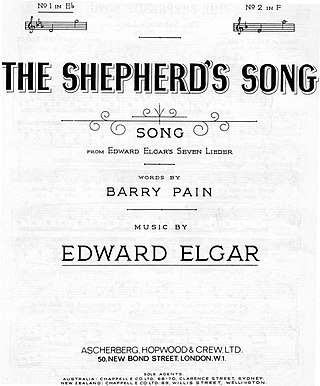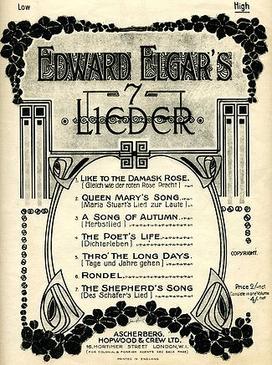Related Research Articles
The Serenade for String Orchestra in E minor, Op. 20, is an early piece in three short movements, by Edward Elgar. It was written in March 1892 and first performed privately in that year; its public premiere was in 1896. It became one of Elgar's most popular compositions, and has been recorded many times.
The Crown of India, was a masque, an elaborate theatrical presentation, staged in 1912 to celebrate the visit the preceding December of King George V and Queen Mary to Delhi for their coronation as Emperor and Empress of India. For this masque, the English composer Sir Edward Elgar wrote the music as his Op. 66, with a libretto by Henry Hamilton. The masque consisted of two tableaux: "The Cities of Ind" and "Ave Imperator!".
"Pleading" is a poem written by Arthur L. Salmon, and set to music by the English composer Edward Elgar in 1908, as his Op.48.

"The Wind at Dawn" is a poem written by Caroline Alice Roberts, and set to music by the English composer Edward Elgar in 1888.

”The Shepherd’s Song” is a song written by the English composer Edward Elgar in 1892. The words are by Barry Pain.

"Come, Gentle Night!" is a poem by Clifton Bingham set to music by the English composer Edward Elgar in 1901.
"Follow the Colours" is a marching song written by the English composer Edward Elgar in 1907, with words by Capt. William de Courcy Stretton. The song is for male voice solo with an optional male voice chorus, accompanied by piano, orchestra or military band.
"The Blue Mountains" is a poem written by Alfred Noyes, and set to music by the English composer Edward Elgar. It was one of the songs written to be performed in the Pageant of Empire at the British Empire Exhibition in Wembley Park, London, on 21 July 1924.
"Shakespeare's Kingdom" is a poem written by Alfred Noyes and set to music by the English composer Edward Elgar. It was one of the songs written to be performed in the Pageant of Empire at the British Empire Exhibition on 21 July 1924.
"The Heart of Canada" is a poem written by Alfred Noyes, and set to music by the English composer Edward Elgar. It was one of the songs written to be performed in the Pageant of Empire at the British Empire Exhibition at Wembley Park on 21 July 1924.
"Merchant Adventurers" is a poem written by Alfred Noyes, and set to music by the English composer Edward Elgar. It was one of the songs written to be performed in the Pageant of Empire at the British Empire Exhibition on 21 July 1924.
"The Immortal Legions" is a poem written by Alfred Noyes, and set to music by the English composer Edward Elgar. It was one of the songs written to be performed in the Pageant of Empire at the British Empire Exhibition on 21 July 1924.
"Sailing Westward" is a poem written by Alfred Noyes, and set to music by the English composer Edward Elgar. It was one of the songs written to be performed in the Pageant of Empire at the British Empire Exhibition, Wembley Park, on 21 July 1924.
"A Song of Union" is a poem written by Alfred Noyes, and set to music by the English composer Edward Elgar. It was one of the songs written to be performed in the Pageant of Empire at the British Empire Exhibition on 21 July 1924, though this particular song was not performed at the Pageant.
The Pageant of Empire was the name given to various historical pageants celebrating the British Empire which were held in Britain during the early twentieth century. For example, there was a small Pageant of Empire at the town of Builth Wells in 1909. In 1911 a giant Pageant of Empire took place at the Festival of Empire at the Crystal Palace in Sydenham, where thousands of amateur performers acted out historical scenes. The most notable was the Pageant of Empire which took place in London in 1924.

Seven Lieder is a set of songs by the English composer Edward Elgar published together in 1907, by Ascherberg, Hopwood & Crew Ltd.
Salut d'Amour (Liebesgruß), Op. 12, is a musical work composed by Edward Elgar in 1888, originally written for violin and piano.
Pageant of Empire is the title given to a set of songs, to words by Alfred Noyes, written by the English composer Sir Edward Elgar and given important positions in the Pageant of Empire at the British Empire Exhibition at Wembley Park.

From the Bavarian Highlands, Op 27 is a work for choir and orchestra by Edward Elgar.
The Powick Asylum Music consists of a number of sets of dance music – quadrilles and polkas – written by Edward Elgar during his time as bandmaster at the Worcester City and County Lunatic Asylum between 1879 and 1884. The music was not published, but the original manuscripts of instrumental parts are preserved in the collection of the Elgar Birthplace Museum.
References
- ↑ Kennedy, Michael (1987). Portrait of Elgar (Third ed.). Oxford University Press. pp. 181, 356. ISBN 0-19-284017-7.
- ↑ Moore, Jerrold Northrop (1984). Edward Elgar: A Creative Life. Oxford University Press. p. 768. ISBN 0-19-315447-1.
- Foreman, Lewis (ed.),"Oh, My Horses! Elgar and the Great War", Elgar Editions, Rickmansworth, 2001 ISBN 0-9537082-3-3
- Richards, Jeffrey "Imperialism and Music: Britain 1876-1953" (Manchester University Press, 2002) ISBN 0-7190-4506-1